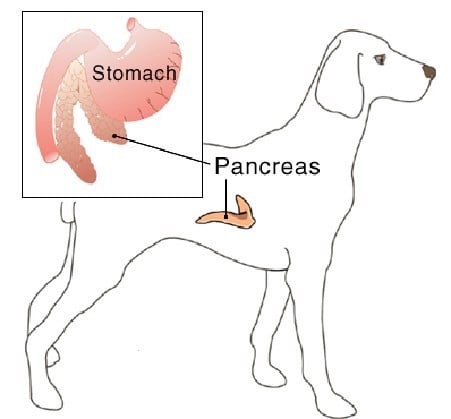- This post contains affiliate links. Read more here.
- Not a substitute for professional veterinary help.
Diabetes is a chronic disease that impacts millions of humans worldwide. It occurs when the body’s ability to produce or respond to the hormone insulin is impaired. But what about dogs? Is dog diabetes a condition that affects our furry pals?
Canine diabetes is an incurable, but manageable disorder, affecting dogs worldwide. With proper treatment, diabetic dogs can lead long, healthy, happy lives.
How does dog diabetes work?
The most common form of dog diabetes is diabetes mellitus, or “sugar diabetes.” As its name implies, sugar diabetes is a condition that affects your dog’s blood sugar level. A small organ near the stomach, the pancreas, is responsible for regulating blood sugar by producing insulin.
Here’s how it works: When your dog eats, her food is broken down into tiny components including carbohydrates. Carbs are then converted into simple sugars, including glucose. The pancreas releases insulin go help turn glucose to fuel inside your dog’s cells.
If there’s not enough insulin available, glucose can’t get into cells. This can lead to a dangerously high glucose concentration in your dog’s bloodstream.
Two forms of dog diabetes
In a healthy dog, the pancreas produces insulin to moderate the sugar in their system. In a diabetic dog, the pancreas either can’t produce enough insulin, or the dog’s body can’t effectively use the insulin it does produce. These are the two forms of diabetes:
- Insulin-deficiency diabetes: The most common type of canine diabetes. This occurs when the dog’s body doesn’t produce enough insulin. Dogs with insulin-deficiency diabetes need daily insulin shots to replace what their body can’t produce.
- Insulin-resistance diabetes: when the pancreas produces some insulin, but the dog’s body doesn’t use the insulin as it should, causing high blood sugar levels. This type of diabetes is most common in older, obese dogs.
For both types of diabetes, the negative impact on the body is the same. Too much sugar builds up in their bloodstream, while the cells that require sugar to function can’t access it.
Canine diabetes symptoms
The build-up of excess sugar in the blood leads to these four major symptoms of canine diabetes:
- Increased urination
- Excessive thirst
- Weight loss
- Increased appetite
If untreated, diabetes can advance to include these symptoms:
- Sweet-smelling or fruity breath
- Lethargy
- Dehydration
- Urinary tract infections
- Kidney failure
- Cataract formation and eventual blindness
- Chronic skin infections
As with any health issue, consult your veterinarian if you notice unusual changes in your dog’s behavior or appearance.
Diabetes is a condition that’s severity depends on how soon it’s diagnosed and treated, so if you’re suspicious your dog is showing any of these symptoms, a trip to the vet could save you both a lot of trouble in the future.
Dogs most likely to get diabetes
There is no definitive cause for diabetes. However, certain factors may increase the likelihood of diabetes in your dog:
- Advanced age. Most dogs who develop diabetes are five or older when diagnosed.
- Chronic or repeated pancreatitis (inflammation of the pancreas), which can damage the organ
- Obesity, which contributes to insulin resistance and is a risk factor for pancreatitis
- Steroid medications used long-term
- Cushing’s disease (which increases steroids in the system)
- Intact female dogs are twice as likely as male dogs to develop diabetes. One more reason why having your dog fixed can save lives!
Genetics also play a role. These are the dog breeds most likely to develop diabetes:
- Beagles
- Bichons Frises
- Cairn Terriers
- Dachshunds
- Fox Terriers
- Keeshonds
- Poodles
- Pugs
How diabetes in dogs is treated
When your dog is first diagnosed with diabetes, you may have to make more frequent vet visits for testing and medication adjustments. The veterinarian will help determine the best treatment and management plan for your dog and monitor her progress in the early stages.
Treatment for dog diabetes is typically straightforward and easy to integrate into your daily routine. It includes:
- A balanced diet including high-quality protein, fiber, and complex carbohydrates to help slow the absorption of glucose. Wellness CORE and Blue Buffalo make highly-regarded options; check with your vet for recommendations and before trying any new food.
- Moderate, consistent exercise to help maintain glucose levels.
- Daily insulin injections under the skin. The idea of giving your dog shots every day can be intimidating but don’t worry, it’s not that hard!
- Glucose monitoring at the vet’s office or at home
Your vet will also instruct you to give your dog insulin at the same time every day, and feed her regular meals in conjunction with her medication.
Lastly, adding a tag to your dog’s collar that lets everyone know your dog is insulin-dependent is a good move. This tag is a good option.
If your dog is diagnosed with diabetes, don’t panic. Once you get the hang of treatment, you won’t need to visit the vet as often. With a consistent care routine, you and your dog can spend many more happy, healthy years together.





